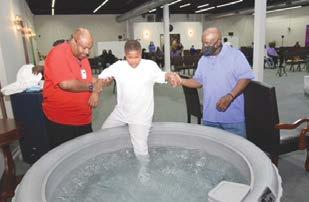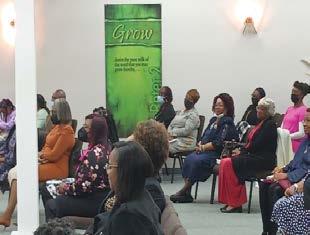
11 minute read
Covid Kicked Down the Walls
by Jacob Clagg with Dr. Randall Hall-Walker and Pastor Reginald Byrden
If you can believe it, the Covid19 pandemic began more than three years ago. March of 2020 marks the month when most institutions across the country, churches especially, began to feel the sting of the pandemic and of local shutdowns. It was different region by region, and in some respects, different for each church, but most churches stopped in-person services for at least a week while they geared up for either online services or reduced/limited in-person services. Other churches found creative ways to do outside services, parking lot services, even radio transmitted services. On the one hand, after three years, many churches have returned to some sense of normalcy, with a few pieces of covid memorabilia still dotting the church. Masks and hand sanitizer probably sit in a corner somewhere or by the main entrance. The online giving application is probably going to remain a new pillar for church funding, and services will continue to be livestreamed or uploaded online. On the other hand, many things have not returned to normal, or as many have said, Covid has become the new normal. Some churches never “bounced back,” as they found people and funds still smaller than they were in the beginning of 2020. Yet still more churches were either forced to close their doors, or they never reopened to begin with.
This is to say, Covid is not remembered fondly by most ministry leaders. It was a time (perhaps it still is) of unease for the future, tension between ministry partners and congregations, financially conservative belt tightening, and non-stop cultural battles. It is most often remembered as a time of painful stagnation, or upsettingly rapid change. Considering all that, it was both surprising and refreshing to hear the exact opposite perspective from two pastors in our Southeast Region.
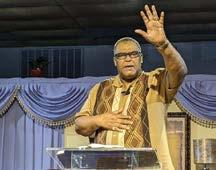
Dr. Randall Hall-Walker
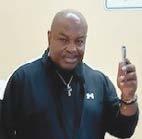
Pastor Reginald Byrden
Dr. Randall Hall-Walker and Pastor Reginald T. Byrden from the CGGC’s Southeast Region remember Covid differently. They remember days and weeks when the church stepped up and stepped in to meet the needs of their communities. They remember how the church broke out of its walls to minister to people close and far, making bigger impacts than they had in a decade. Most of all, they remember how before Covid, the church felt like it had lost its purpose, and how Covid helped their congregations reclaim their mission for God’s kingdom.
Covid was Joyful
Dr. Randall Hall-Walker of Freedom Worship Center in Charlotte, North Carolina, and Pastor Reginald Byrden from Grace Fellowship Church in Columbia, South Carolina don’t just remember Covid for how it helped change their churches, they remember it as genuine joy, which is in stark contrast to the typical way we hear it talked about. “It was really a great experience for us… It was an exciting time in terms of reaching out, reaching out to the community,” Dr. Randall Hall-Walker declared. “It was a great encouragement to me because the Gospel was still going forth.”
The stress of Covid was one of the predominant themes coming out of local gatherings of church leaders. Pastors often lamented how exhausted and burnt out they had been feeling about the last few years, but Pastor Byrden shares the exact opposite experience. When asked for an interview in his local newspaper about the stress caused by Covid on pastors, Pastor Byrden responded by saying ,“I don’t know how good my article is going to be because I really don’t have any. My congregation did not stress me… Praise be to God, my congregation, they just continued to follow what God gave us, and how He guided us in [His] direction.” Much of this stress reduction was probably because of the external focus of the congregation. They had a purpose outside of themselves and Pastor Reginald cites that outside of worship services and events they routinely held to work in the community, they stopped having so many meetings. Quarterly, monthly, and weekly meetings were largely gone. Indeed, Covid revealed all kinds of busy work that hardly amounted to any kind of substantive impact. And so both congregations were able to look at the standard practices of a given week and do away with the work that wasn’t making a direct impact on their communities.
Covid was an Awakening
While there are many different kinds of small shifts that happened, almost all of them could be neatly explained by the paradigm shift from an internal focus to an external focus, or, as Pastor Byrden said, “Covid was a coming out party.” It’s exactly the kind of awakening to their mission that churches around the United States have recognized is sorely needed, and for these two congregations, the pandemic forced it to happen.
Not only has Covid been see as a largely positive experience for Dr. Randall and Pastor Byrden, but they go further by suggesting that Covid fundamentally reshaped their understanding of the church. Pastor Byrden says that, “[Covid] gave us a church perspective to see the church at its best. It allowed us to operate the church without walls. Our parking lot became a distribution center every week, for families and others. It allowed us to see what the church should really be about, and that was to impact our city, our community, and the corner which we reside on… We were able to maximize ministry [at] a whole new level.”
For Grace Fellowship Church, Covid pushed them to see the needs of people in their community more clearly, and, in turn, to focus on the hungry and the unemployed in ways they hadn’t before. Pastor Byrden and his team at Grace Fellowship decided to start a meal program, and every week they passed out packaged meals, using their parking lot as a drive through for residents of their city. Pastor Byrden says that some weeks they would run out of meals within 15 minutes of starting because the need was so great.
Likewise, Dr. Hall-Walker and his church, Freedom Worship Center in Charlotte, North Carolina, started their own meal program, while helping with medical needs, and helping the unemployed to fill out applications. Dr. Hall-Walker said, “We were determined to stay essential.” When most other places were shutting down due to government demands, only a select few places were deemed “essential” and allowed to remain open. When the leadership at Freedom Worship Center heard that Walmart was giving out letters to their employees to show to local authorities, they said “Well, if Walmart can do it, certainly the church can!” They believed the church should be essential, and if it wasn’t, that didn’t speak well to the state of the church in their community.
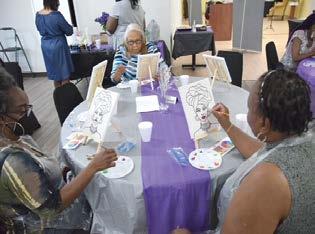
The most obvious change that the pandemic brought about was the need to reach out beyond the walls of the church. At a practical level, most churches have done this with their move toward online integration, and so did both Grace Fellowship and Freedom Worship Center, but Freedom Worship Center also began a parking lot ministry, incorporating both radio and the internet in order to broaden their reach and to make their services more accessible. And over time both of these have developed into an entire channel of digital material, from an actual radio station broadcast at 87.9 FM around Pineville, South Charlotte, to their Journey to Greatness Broadcast program, and even acting classes put on by Birdella Hall-Walker, Dr. Randall’s wife.
Because the focus had been taken away from the internal church, the dynamic between churches was also radically shifted. Both Pastors reflected on how the pandemic brought a powerful sense of unity to all churches. “Covid brought us all on the same page,” Dr. Hall-Walker said, suggesting that mega churches and small churches were all trying to navigate Covid for the first time. No one had the answers, and so the pressure of being compared to other churches was lifted. Likewise, most churches were “over capacity” for the first time (the limit set by the government for how many people could gather in a given space) which had a positive effect. It felt good for pastors who were at capacity, knowing they had legally topped out, and the constant pressure to bring in more people could be reined in. Likewise, Pastor Reginald Byrden shared that, “One thing Covid taught us, none of us, whether we pastored a congregation of fifty or thousands, one year or twenty-five years, all of us was unexperienced at pastoring during Covid. None of us had any experience of how to navigate during this season. It allowed us to build more brotherly love with pastors. Put all of us on the same boat.”
Covid Revealed God’s Plan
Both pastors spoke candidly about why they believed Covid was ultimately helpful for their ministries. Their key takeaway was that, while they were both shocked by the pandemic like everyone else, in hindsight they realized that they were being prepared in advance. Dr. Hall-Walker mentioned that their online presence had already taken shape before the pandemic hit and that “We only increased our online activity, to make it more appealing to people.” And he likewise talked about how surprised he was to find that the vast majority of churches in his area were making Facebook accounts and YouTube pages for the first time during the pandemic. Dr. Hall-Walker went on to explain why he believes other churches really struggled or why they didn’t survive Covid. “Churches that were struggling before the pandemic, when the pandemic hit, they ceased to exist. But those who were committed before, they were committed during, like Brother Byrden, they thrived.” After acknowledging how harsh that statement was, he qualified it by saying, “I’m not coming against pastors, but the reality was that they did not live what they were teaching.”

Pastor Byrden, on the other hand, spoke about how his leadership team made a smooth transition to remote work because there had always been a decentralized work culture at Grace Fellowship since their foundation. Even when they finally had a church building to call their own, they were already prepared for Covid, saying, “When Covid hit, people were trying to figure out how to get their staff to work from home, we already were.” The key takeaway from both pastors was that God had prepared them and their ministries in advance for what was about to take place.
Both recognized, of course, that Covid wasn’t easy. They are both still in constant dialogue with pastors who are struggling and who had very different experiences than what they had. The question has been asked “How do you preach to an empty church?” To those pastors, Pastor Reginald encourages them, saying that "you’re going to have to get used to preaching to that little green light,” meaning the light of the camera when it’s live. He says that they shouldn’t worry if they only have a few people in their building, because with their online services, “You have the whole world. When you stand behind the sacred desk, make the book talk.”
As we wrapped up our interview, Pastor Byrden gave a clear snapshot of what he saw God doing through Covid, and what the new paradigm is for the future church.
“During this Covid season, God has sustained the church. Covid allowed us to be able to tackle the task at hand. It allowed us to be able to embrace the changes at the church… If you’re trying to move the church back to the 3rd Sunday of March of 2020, you’re really going to struggle and kill the church. I think Covid allowed us in our churches, as leaders, to embrace change, to accept change, to find new ways to do ministry.”
